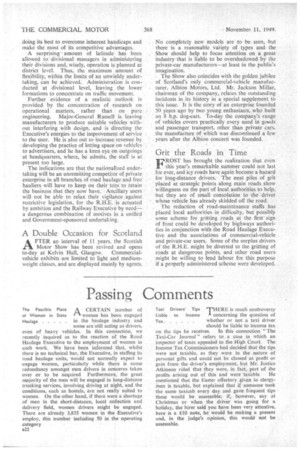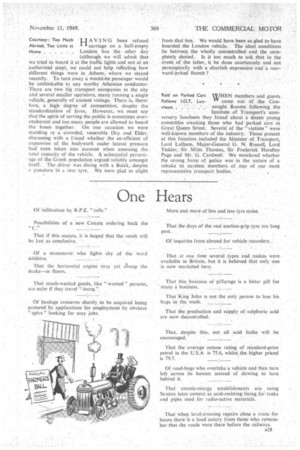Passing Comments
Page 56

Page 57

If you've noticed an error in this article please click here to report it so we can fix it.
The Possible Place A CERTAIN number of of Women in State 1-k women has been engaged Haulage in the haulage industry and some are still acting as drivers, even of heavy vehicles. In this connection, we recently inquired as to the reaction of the Road Haulage Executive to the employment of women in such work. We have been informed that, whilst there is no technical bar, the Executive, in staffing its road haulage units, would not normally expect to engage women, particularly while there is some • redundancy amongst men drivers in concerns taken over or to be acquired. Furthermore, the great majority of the men will be engaged in long-distance trunking services, involving driving at night, and the conditions, such as hostels, are not really suited to women. On the other hand, if there were a shortage of men in the short-distance, local collection and delivery field, women drivers might be engaged. There are already 3,835 women in the Executive's employ, this number including 50 in the operating category
B22
Taxi, Drivers Tips THERE is much controversy Liable to Income concerning the question of
Tax whether or not a taxi driver should be liable to income tax
on the tips he receives. In this connection "The Taxi-Car Journal" refers to a case in which an inspector of taxes appealed to the High Court. The Income Tax Commissioners had decided that the tips were not taxable, as they were in the nature of personal gifts and could not be classed as profit or gain from the driver's employment, but Mr. Justice Atkinson tilled that they were, in fact, part of the profits arising out of this and were taxable. He mentioned that the Easter offertory _given to clergyMen is taxable, but explained that if someone took The same taxicab every day and gave frequent tips these would be assessable; if, however, say at Christmas or when the driver was going for a holiday, the hirer said you have been very attentive, here is a £10 note, he would be making a present and, in the judge's opinion, this would not be assessable.
Courtesy: Too Much • 1.1 A VING been refused Abroad, Too Little at " carriage on a half-empty Home London. bus the • other day
• (although we will admit that we tried to board it at the traffic lights and not at an Authorized stop), we could not help reflecting how different things were in Athens, where we stayed recently. To turn away a would-be passenger would be unthinkable to any worthy Athenian conductor: There are two big transport companies in the city and several smaller operators, many running. a, single vehicle, generally of-ancient vintage. There is, therefore, a high degree of competition, despite the standardization of fares. However, we must say .thaf the spirit of serving the public is sometimes overexuberant and too -many people are allowed to board the buses together: On one occasion we were standing in a crowded, venerable Day. and -Elder, discussing with a friend whether the co-efficient of expansion of the bodywork under lateral pressure had been taken into account when assessing the total capacity of the vehicle. A substantial percentage of the Greek population argued volubly amongst itself. The.driver was dicing with a Buick, despite a puncture in a rear tyre. We were glad to alight from that bus. We would have been as. glad to have boarded the London vehicle. The ideal conditions lie between the wholly uncontrolled and the completely denied. Is it too much to ask that in the event of the latter, it be done courteously and not peremptorily with a churlish expression and a rearward-jerked thumb ?
Raid on Parked Cars WHEN members and guests Follows 1.0.T. Lun'IV came out of the Con cheon . . . . . naught Rooms following the Institute of Transport's anniversary !unchain they found about a dozen young constables awaiting those who had parked cars in Great Queen Street. Several of the" victims" were well-known members of the industry.. Those present at this function included the Minister of Transport, Lord Latham, Major-General G. N. Russell, Lord Tedder; Sir Miles Thomas, Sir Frederick Handley Page and Mr. G. Cardwell. We wondered whether the strong force of police was in the nature of a rebuke to careless members of One of our most representative transport bodies.
































































































































































































